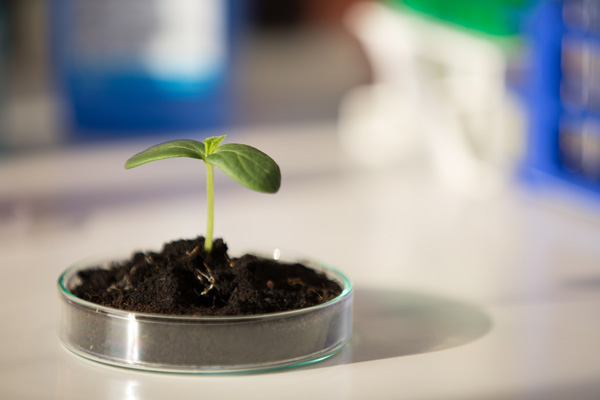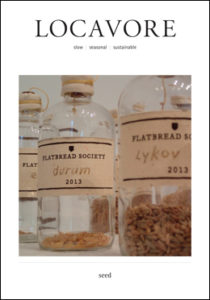A Grim Experiment in ‘Scientific’ Eating

When I was a child the science fiction vision of the future was of a world without food.
In the future, we were told, we could do away with the drudgery of farming, cooking and even eating and just take a pill that would deliver all our daily nutritional requirements.
Even at a young age that sounded pretty grim. Science, then as now, made a grave mistake in assuming that we’d all be happier to have food removed from our lives, from the social contexts that make it meaningful, and reduced to a checklist of qualities or traits such as nutrients.
That checklist still exists but with the introduction of genetically modified organisms (GMOs) it has grown more sophisticated – and even more grim.
An uncontrolled experiment
Although biotechnology companies that produce GMO crops claim these are the same as naturally bred crops, the World Health Organization (WHO) and most regulatory authorities define a GMO as: ‘…organisms (i.e. plants, animals or microorganisms) in which the genetic material (DNA) has been altered in a way that does not occur naturally…’
Plants produced by GM technology are new to our environment and new to the human diet. Humans have been farming for around 12,000 years; GMOs have only been in our food system for 20 years.
In addition, GMOs were released into the human food chain without any safety testing – and biotech companies continue to resist calls for such testing, even in the face of animal tests showing health harm.
GMO crops were released into nature without understanding how they might alter fragile ecosystems or even change farming practice – and we are now reaping the effects of higher pesticide use, soil damage, loss of biodiversity and the emergence of superweeds (resistant to the herbicides used on GM crops) and superbugs (resistant to the insecticides bred into GM crops). In short, GMOs have turned our food system into a large uncontrolled experiment, of which all of us are a part.

A risky experiment
For me, the patenting of seeds, and the DNA of living plants, is potentially the most risky experiment of all. Patents prevent farmers from saving or exchanging seeds which, in addition to being important for profitable farming, is simply a time-honoured right.
Patents also create monopolies, which, although profitable for corporations make seed more expensive for farmers, undermining the choices they can make about what to grow, and the choices that we as consumers make about what we eat.
But in consolidating the traits of plants through GM technology we are also reducing genetic diversity – and therefore the resilience plants need to withstand problems like drought, flood or other consequences of climate change.
This loss of diversity is reaching dangerous proportions. In the last 100 years well over half of global plant genetic diversity has disappeared and what is left is extremely vulnerable.
What we do know and what we don’t
Biotech companies that claim on the one hand ‘substantial equivalence’ – the belief that GM seeds and plants are, to all intents and purposes, the same as their natural relatives – fundamentally contradict their own claims to the patent offices of the world.
Patent law is complex but at heart it relies on the fact that whatever is being patented is ‘substantially different’ enough from what exists in nature to warrant a commercial patent. Essentially in order to patent a seed you have to change it from a living thing to an invention. That seed, and any resulting plants that come from it, becomes the property of the company that ‘invented’ it.
This fact once prompted a friend of mine to ask: If you eat GM food and the corporate-owned DNA survives inside of you, does the biotech company own you too?
In a world where what we know to be true is changing fast, it’s not a dumb question. As little as ten years ago we were absolutely sure that no GM DNA, or its resulting RNA, survives inside of us. Now we know that’s not true. Genetic material in GM soya, for example, has been shown to transfer into the DNA of bacteria living inside our intestines and continues to function.
Biotech companies argue that this doesn’t matter because this genetic material doesn’t have any effect in our bodies. Yet a few years ago, Chinese researchers found small pieces of rice RNA in the blood and organs of humans who eat rice. This genetic material, say the researchers, binds to receptors in human liver cells and influences the uptake of cholesterol from the blood.
There is no reason to assume that RNA from genetically modified plants won’t one day be found, for better or worse, to be active in our bodies.
A cautionary tale
A good example of what we don’t know about GMOs and how the so-called scientific mind-set about nutrition can go awry is playing out before us right now. Rosa Labs which markets Soylent, a liquid nutritional supplement meant to replace meals – and which declares itself ‘proudly made with GMOs’ – has recently withdrawn several products as customers were falling ill after consuming them.
Made using GMO soya, the ironically named product was conceived as the ultimate geek meal, something that computer programmers could gulp down without ever having to leave their screens and still take in enough nutrients to keep going.
We don’t know precisely what made Soylent users sick, but not long ago a Danish farmer found that when he fed his pigs GMO soya they also became ill with gastrointestinal problems and more. Similar reports have come out of the farms in the US.
The good news is that the GMO mindset is increasingly coming under fire from big guns. Headline articles in the New York Times and Wall Street Journal have taken the GMO myth apart with devastating clarity, showing that GMOs are being used to prop up a failing, polluting, wasteful agricultural system that frames food as a commodity or invention rather than a centrepiece of human life.
Proponents snide and sneer at those who talk about GM as ‘unnatural’, or who balk at the ideas of mixing and matching the genetic material of different species of plants and animals, or as is the case with new synthetic biology techniques, writing man-made genetic codes on computers and printing out new species on a 3D printer.
Their disdain displays an extraordinary ignorance of the deep values and need for context that most of us have when it comes to food. It misses the point about the way that the word ‘natural’ – as abused as it has been by corporations over the years – still holds meaning and why so many continue to refuse to sup at the GMO table.
- This article was taken from issue 1 of Locavore, a beautiful new magazine dedicated to slow, seasonal and sustainable food. Read more about the magazine here and preview a sample here. If you’d like to subscribe be sure to use this code Loc01ecor11 to get a 10% discount.












